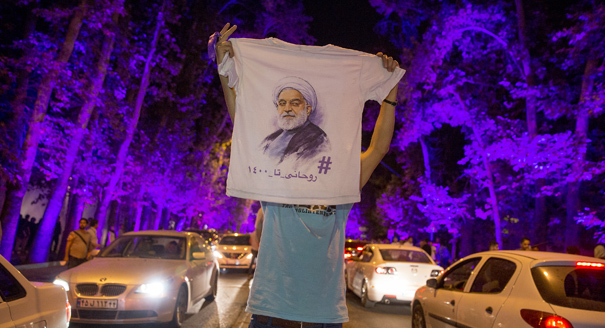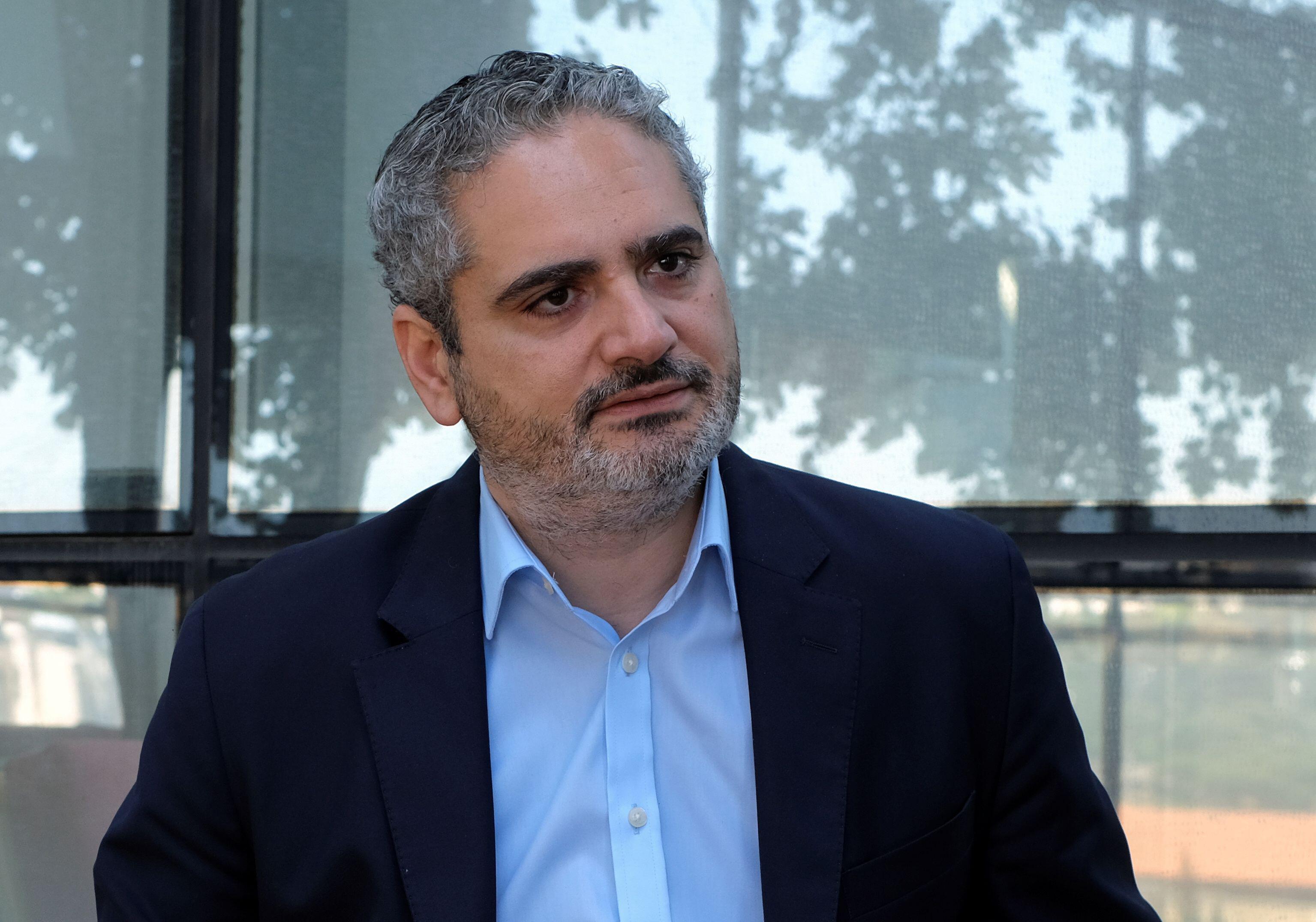A coalition of states is seeking to avert a U.S. attack, and Israel is in the forefront of their mind.
Michael Young
{
"authors": [
"Michael Young"
],
"type": "commentary",
"blog": "Diwan",
"centerAffiliationAll": "dc",
"centers": [
"Carnegie Endowment for International Peace",
"Malcolm H. Kerr Carnegie Middle East Center"
],
"collections": [],
"englishNewsletterAll": "menaTransitions",
"nonEnglishNewsletterAll": "",
"primaryCenter": "Malcolm H. Kerr Carnegie Middle East Center",
"programAffiliation": "MEP",
"programs": [
"Middle East"
],
"projects": [],
"regions": [
"Iran",
"Middle East"
],
"topics": [
"Political Reform"
]
}
Source: Getty
Iran has just completed a presidential election and Carnegie’s Karim Sadjadpour discusses what may lie ahead.
Recently, Iran held a presidential election, which was won by the incumbent, Hassan Rouhani. To shed some light on the election, what the second Rouhani presidency may mean for Iran, as well as the political developments that surrounded the pre-election period, in early June Diwan spoke to Middle East Program Senior Fellow Karim Sadjadpour. Sadjadpour also recorded a longer podcast on the election for Carnegie, which can be accessed here.
Michael Young: Hassan Rouhani has just won reelection as Iran’s president. In what way might his second term be different from his first term?
Karim Sadjadpour: Rouhani’s first term was dedicated to reaching a nuclear deal with international powers in order to win Iran sanctions relief. To do this the president needed the support—or at least the acquiescence—of the supreme leader, Ali Khamenei, and the Revolutionary Guards. Therefore, he didn’t seek to upset them by trying to push for greater political and civil liberties.
In the second term, Rouhani’s supporters are expecting him, in addition to improving Iran’s moribund economy, to be more outspoken in his support of civil society and political liberalization, as he was during his reelection campaign. I’m skeptical of this for a couple reasons. First, Rouhani comes from Iran’s security establishment, and over the past few decades whenever there was a clash between civil society and the regime’s repressive apparatus, he always sided with the latter. Second, if Rouhani’s goal is to be a potential candidate to succeed Khamenei as supreme leader, he will need to reassure Iran’s senior clergy and the Revolutionary Guards that he does not threaten their interests.
MY: In the run up to the election, some critics of Iran’s system wrote that a victory by Rouhani’s rival Ebrahim Raisi would have better highlighted the contradictions in the system. Such a view is based on an assumption that Rouhani is very much a pillar of the system, albeit in more acceptable garb internationally. Your thoughts?
KS: There are three common questions about Rouhani: Does he really want change? Can he really bring change? And what kind of change does he seek? I do think Rouhani genuinely wants to open Iran up economically, relax social restrictions, and normalize relations with the United States, similar to the path China took in the late 1970s.
The question is whether Rouhani will be able to achieve any of these goals during his second term. Here I’m more skeptical. As long as Khamenei remains supreme leader I don’t think these goals are attainable. In some ways Rouhani is trying to reconcile the irreconcilable by appealing to an Iranian electorate that wants sweeping change, while at the same time reassuring a deeply-entrenched Islamic Republic establishment eager to preserve the status quo.
MY: Do you feel that Khamenei’s support for Raisi was merely a tactical move, and that deep down he was happy with the Rouhani victory?
KS: Khamenei stood to benefit from either outcome. Had Raisi won, Khamenei would for the first time have had a compliant president who also shared his worldview and was committed to revolutionary principles, such as animosity toward the United States.
The advantage of Rouhani’s reelection is that it makes it far more difficult for the United States to rally an international coalition to isolate Iran politically and economically. Russia, China, India, and even many European countries believe that Rouhani and Iranian Foreign Minister Javad Zarif are reasonable men who should be engaged, not isolated.
MY: What was the significance of barring Mahmoud Ahmadinejad from the election?
KS: In 2009, Ahmadinejad’s contested reelection provoked unprecedented divisions among Tehran’s ruling elite and Iran’s largest popular uprisings since 1979. Millions protested, over a hundred were killed, and thousands more were injured, imprisoned, and tortured. Nonetheless Khamenei firmly endorsed Ahmadinejad, and hardline clerics such as Ayatollah Mesbah Yazdi famously said, “Obeying the president is like obeying God.”
It’s notable that these same forces, eight years later, decided that Ahmadinejad was unfit to even run for president. When he was disqualified there was virtually no popular reaction. I think Ahmadinejad was Khamenei’s dispensable sword. Khamenei used Ahmadinejad as a bludgeon against his foreign and domestic opponents, most notably his longtime rival Hashemi Rafsanjani (whom Ahmadinejad defeated in Iran’s 2005 presidential election). Once it became clear that Ahmadinejad had grander ambitions for himself, Khamenei and the Revolutionary Guards thoroughly emasculated him.
MY: The U.S. Senate is about to impose new sanctions on Iran. What will the impact be in light of the Joint Comprehensive Plan of Action reached in 2015?
KS: The new Senate sanctions are not likely to have a big impact. I think the bigger question—both for the Trump administration and the future of the nuclear deal—is whether the Boeing company will be permitted to sell airplanes to Iran, as is stipulated in the nuclear agreement. That is a challenging question for President Donald Trump because it pits his domestic and foreign policies against one another. On the one hand the Boeing deal brings in foreign investment, creates American jobs, and is necessary to uphold the nuclear agreement. On the other hand, prominent members of Congress, including Senator Marco Rubio, believe U.S. companies should be prohibited from selling aircraft to Tehran “until the Iranian regime ceases using commercial airliners for illicit military purposes.”
MY: There is much alarm throughout the Middle East at the expansion of Iranian influence. Do you feel the Trump administration has any coherent plan to prevent this?
KS: The administration is still reviewing its Iran policy, but I think there will be a few notable differences with Barack Obama’s Iran policy. First, it’s likely to have a strong military component given that many of Trump’s top advisors on the Middle East and Iran have military backgrounds. Second, there will be less hesitation to counter Iran for fear of jeopardizing the nuclear agreement (which Trump has called a “disaster”). Third, as we’ve already seen, the new policy will be premised on closer ties with Washington’s traditional regional allies such as Israel and Saudi Arabia.
Iranian influence in the Middle East is greatest in states with weak central governments, fractured militaries, and divided societies—including Syria, Yemen, Iraq, and Lebanon. Tehran has sought to fill the political vacuums that were created by the 2003 Iraq war and the 2011 Arab uprisings. No matter what strategy the Trump administration devises, there are no quick or easy ways to restore order and stability to the region.
MY: How would you assess the impact of Iran’s policies in Syria? The Assad regime appears to be entirely dependent on Russia and Iran, and perhaps more so on the latter. Surely this must count as a major victory for the Iranian regime, no?
KS: It’s clear that Iranian financial and military support—including the deployment of thousands of Revolutionary Guards and Hezbollah and other Shi‘a fighters to Syria—prevented the Assad regime from collapsing. In 2017 this is considered a major geopolitical victory for Iran, but by 2027 it may be perceived as a Pyrrhic victory.
I believe the Iranian regime’s support for Assad will be a stain on Iran’s image for decades to come. Iranians still remember the damage Saddam Hussein inflicted on their country over three decades ago, but the destruction Assad and his backers have inflicted on Syria is far greater. This includes 500,000 deaths, over 12 million internally or externally displaced persons, and thousands of Syrians, many of them women and children, who have been targeted by chemical weapons attacks.
MY: Khamenei is getting on in age, though he remains very much in control. How do you anticipate the coming five years in Iran as the likelihood of a transition becomes more likely?
KS: Khamenei is nearly 78, and people have been speculating about his health, and succession, for over a decade. Though it’s plausible that he is currently ill and has limited time left, it’s also possible he could remain in power for the next ten years.
While the succession is totally unpredictable and there are no obvious frontrunners, the two institutions that will likely play a critical role in choosing the next leader—the Assembly of Experts and the Revolutionary Guards—are led by individuals who were chosen by Khamenei. Hence, it’s more likely that the next supreme leader will not differ significantly from Khamenei in both his internal and external vision for Iran.
Carnegie does not take institutional positions on public policy issues; the views represented herein are those of the author(s) and do not necessarily reflect the views of Carnegie, its staff, or its trustees.
A coalition of states is seeking to avert a U.S. attack, and Israel is in the forefront of their mind.

Michael Young
The country’s leadership is increasingly uneasy about multiple challenges from the Levant to the South Caucasus.

Armenak Tokmajyan
In an interview, Shahla al-Kli discusses the country’s parliamentary elections and what they reveal.
Rayyan Al-Shawaf
Ankara may seek to annul a maritime deal with Cyprus and expand its influence in the next parliament.

Mohanad Hage Ali
Recent election results have placed Nouri al-Maliki in a strong position to name the next prime minister.
Wladimir van Wilgenburg